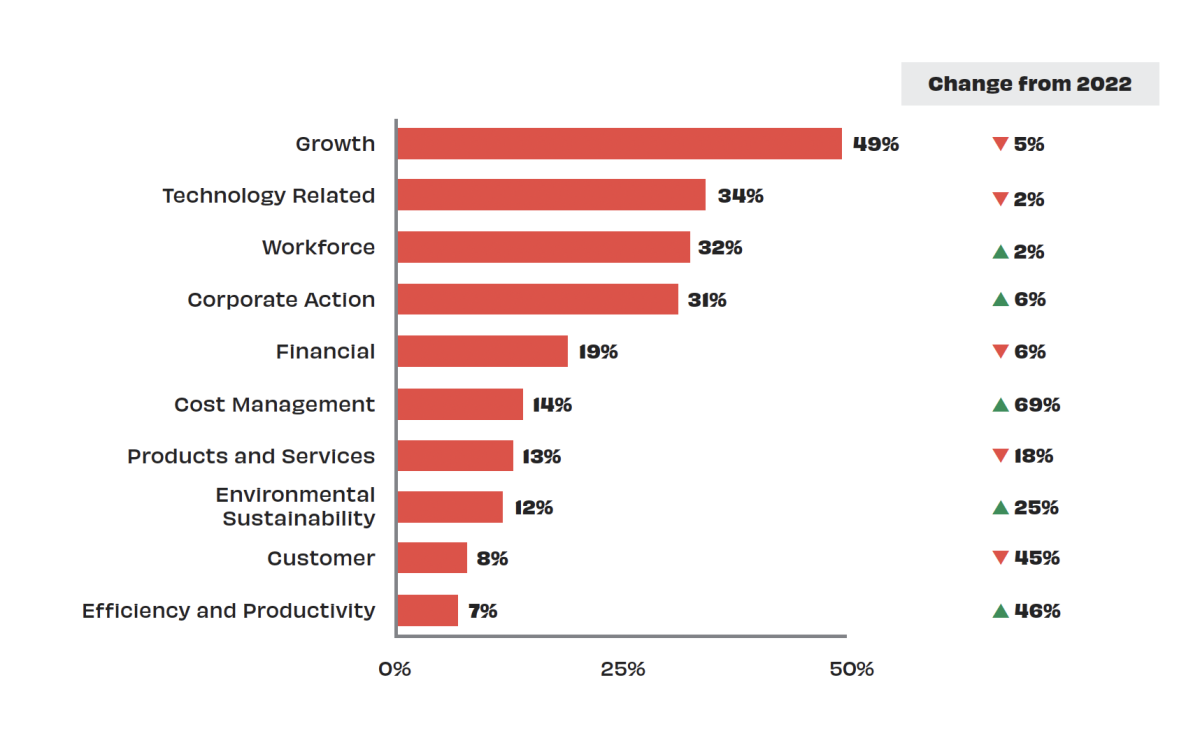CEO Priorities and Attitudes Shift in 2023

Battling Inflation and Talent Retention Remain Top Priorities After Years Of Volatility; Technology - and Its Impact - Are Becoming Increasingly Important
- Share via
The 2023 Gartner CEO and Senior Business Executive Survey was conducted from July through December 2022, gathering data from over 400 CEOs and other senior business executives in North America, Europe, Asia/ Pacific, Latin America, the Middle East, and South Africa, across different industries, revenue, and company sizes.
“When determining business priorities, CEOs are hesitant, but not frozen,” said Kristin Moyer, distinguished VP analyst at Gartner. “More than half of CEOs believe an economic downturn or recession in 2023 will be shallow and short, and the survey showed only a modest rise in cash flow, capital, and fundraising concerns.”
Despite the impact of these economic headwinds, half of CEOs cited growth as the top strategic business priority for the next two years. Technology also remains a top focus area for CEOs, closely followed by workforce issues. “After three years of volatility, CEO priorities are stabilizing,” said Mark Raskino, distinguished VP analyst at Gartner. “Executive leaders are looking past the aftershocks of the omni-crisis period to a time when talent, sustainability, and next-level digital change will be the levers of competitive performance.”
In fact, mentions of environmental sustainability rose 25% over the previous year’s survey, which was the first time sustainability ranked among CEOs’ top 10 priorities. Gartner predicts that by 2026, environmental sustainability will be a higher CEO strategic business priority than the technology-related category.
AI Considered Most Impactful Tech
The survey also revealed that artificial intelligence (AI) was the top technology that CEOs believe will significantly impact their industry over the next three years, cited by 21% of survey respondents.
“Generative AI will profoundly impact business and operating models,” said Raskino . “However, fear of missing out is a powerful driver of technology markets. AI is reaching the tipping point where CEOs who are not yet invested become concerned that they are missing something competitively important.”
Inflation Drives Shifts in Customer Behavior
Inflation was ranked as the most damaging business risk by 22% of CEOs, and nearly a quarter cited greater price sensitivity as the biggest shift in customer expectations they anticipate this year. However, increasing prices is still the top action that CEOs are taking in response to inflation (44%), followed by cost optimization (36%) and productivity, efficiency, and automation (21%).
“It’s concerning that CEOs do not yet seem to be focused on productivity as much as they should be in an inflationary period,” said Moyer. “This may be due to wishful thinking that inflation will not become a persistent feature of the economic landscape. CEOs must embrace automation to redesign methods, processes, and products for efficiency, rather than pushing cost increases onto customers.”
Attracting and Retaining Talent Is the Top Workforce Priority
When asked about the impact of various risks on the business, 26% of CEOs cited talent shortage as the most damaging risk for their organization. Attracting and retaining talent is, by far, CEOs’ top workforce priority. Concerns about compensation are the biggest shift in employee and prospective employee behavior that CEOs anticipate, followed by a desire for greater flexibility and remote or hybrid work. “The emphasis on pay is not surprising in an inflationary environment, but in prior economic cycles, unemployment would typically be undermining labor market power,” said Raskino.